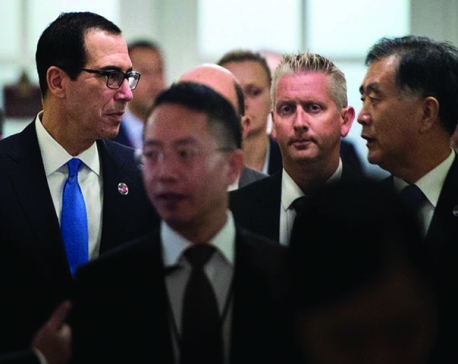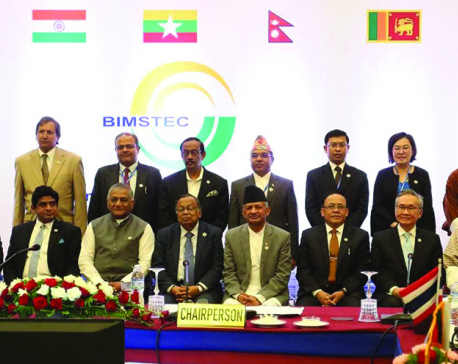
OR
Opinion
Time to invest in our own universities
Published On: September 5, 2021 06:30 AM NPT By: Angel Sharma


Angel Sharma
The author is a PhD candidate in Strategic Management at the University of New South Wales in Australia.news@myrepublica.com
More from Author
The problem with attracting foreign affiliates that are ranked poorly themselves has dire consequences for the local academic ecosystem. In a metaphoric programming language, we can refer to this as garbage in, garbage out. If we attract low-quality foreign institutions, our academics learn low-quality stuff, which then gets transferred to our own institutions.
The public criticism of our universities has risen in the last few decades. Taking on this opportunity, foreign universities have now established a strong foothold in our country. However, such universities are accessible to only a small group of the population, mainly to those that belong to the middle or upper sects. The rest are left to grapple with the outmoded education that our universities provide. This article presents problems with foreign universities and their affiliates (henceforth known as the affiliates), and discusses how Nepali universities and the government can work together for the benefit of our local universities.
Problem with our universities and extant foreign affiliates
There are two problems with foreign universities and their affiliated colleges for Nepal. First, the inequality it creates from an education point of view is problematic. Only the wealthy have access to such colleges, and therefore, the gap between the rich and the poor widens, albeit academically. Second, and more concerning is that the foreign affiliates take a huge portion of the Nepali money back to their own countries. More surprisingly, the government has not been able to react to this phenomenon of rising foreign universities. Through this article, I discuss a few alternatives that we can work within the short term and the long term to ensure that we invest money in our own universities and enable them to withstand foreign competition.
Our universities lag in curriculum design and research. For example, while other (foreign) universities offer simulations to replicate real-world scenarios for their students, our universities are stuck in the same old rote learning mode. Students are assessed on questions that are repeated every year. In this old model, students are encouraged to buy question “guides” that exist out there with ready-made answers, and the students are assessed to the degree to which they can emulate such answers. Unfortunately, this produces graduates with degrees that look charming but without any underlying knowledge that will benefit them in the future.
Our universities are desperate for change. We can start by learning from these foreign affiliates, but our universities must be choosy. Not all affiliates that are in Nepal are of quality. Indeed, a majority of the affiliates are in the 500-1000 rank. Such universities are not generally known for their quality of research.
Learning from neighbors
A more promising avenue lies in increasing our ability to attract our own Nepali graduates from top universities around the world. This is also synchronous with the attempts in India, where the government has launched the Prime Minister’s Scientist Return to India (SRI) program. Academics of Indian origin are encouraged and provided with good remuneration along with air tickets to visit and contribute to the academia in India under the SRI program. China has also had a similar program in place for a while. Unfortunately, we lag in this aspect as well.
The problem with attracting foreign affiliates that are ranked poorly themselves has dire consequences for the local academic ecosystem. In a metaphoric programming language, we can refer to this as garbage in, garbage out. If we attract low-quality foreign institutions, our academics learn low-quality stuff, which then gets transferred to our own institutions. Our neighbors on the other hand have successfully attracted renowned top-ranked universities such as Harvard, and New York University, among others.
Time to bid farewell to foreign affiliates
We do not have to be too worried about these extant foreign affiliates. The government has a rule in place which mandates these foreign affiliates to renew their license every two years. The government may implement strict policies such as requiring these foreign affiliates to publish X amount of research papers in X top journals, which then will force them to enhance their local standard. The ones that do not meet this criterion will be forced to shut off. Such a policy works amazingly. In fact, university lecturers in top universities are promoted based on their number of publications in top journals. We can use the same criterion to decide which universities to keep and which to get rid of. For example, management business schools may use the Australian Business Deans Council Journal Quality List and require foreign affiliates to publish at least one A* paper and two A-rated papers every three years. This will help create a quality-based knowledge ecosystem, which will ultimately benefit our own institutions.
Our government should also proactively monitor the amount of money that is going out of these foreign affiliates. For a country such as ours that is heavily reliant on remittance, we cannot afford to lose a lot of money. Of course, monitoring itself does not solve the problem. The bigger problem lies in upgrading our local universities and providing them with huge research funds that will over time replace foreign universities.
Way forward
We need a program such as the SRI initiative in India. Our professors need to be trained to publish in top journals in their field. Our science laboratories need equipment upgrades that are accessible to students. We need to be choosy in which universities to let in and which to bid a farewell to. We need to invest heavily in research in the next decade so that we can strengthen our own academic position in the global market. Our government should come up with strict policies to discourage foreign universities that continue to flood our market. Nepali students should be as proud to have a Nepali degree as they would when they have a British or an American one.
To reiterate, our educational ecosystem needs a complete rework. We need to redesign our curriculums but more importantly, pay attention to the existing ecosystem of foreign affiliates with low global rankings. We need top universities to enter the local market so that we can learn from them, whilst also ensuring our students get top degrees and obtain knowledge that allows them a competitive advantage in the global marketplace.
(The author is a PhD candidate in Strategic Management at the University of New South Wales in Australia.)
You May Like This

America’s self-defeating China policy
After decades of globalization and technological progress, countries are more interconnected than ever, with policy decisions made in one country... Read More...

Accountability check
Now is the time for ministers of two-thirds majority government to take accountability issue really seriously ... Read More...

Some hard truths
BIMSTEC might have a hard time taking off because of growing mutual suspicions and New Delhi’s aspiration to ignore... Read More...




Just In
- MoHP cautions docs working in govt hospitals not to work in private ones
- Over 400,000 tourists visited Mustang by road last year
- 19 hydropower projects to be showcased at investment summit
- Global oil and gold prices surge as Israel retaliates against Iran
- Sajha Yatayat cancels CEO appointment process for lack of candidates
- Govt padlocks Nepal Scouts’ property illegally occupied by NC lawmaker Deepak Khadka
- FWEAN meets with President Paudel to solicit support for women entrepreneurship
- Koshi provincial assembly passes resolution motion calling for special session by majority votes







_20220508065243.jpg)





Leave A Comment